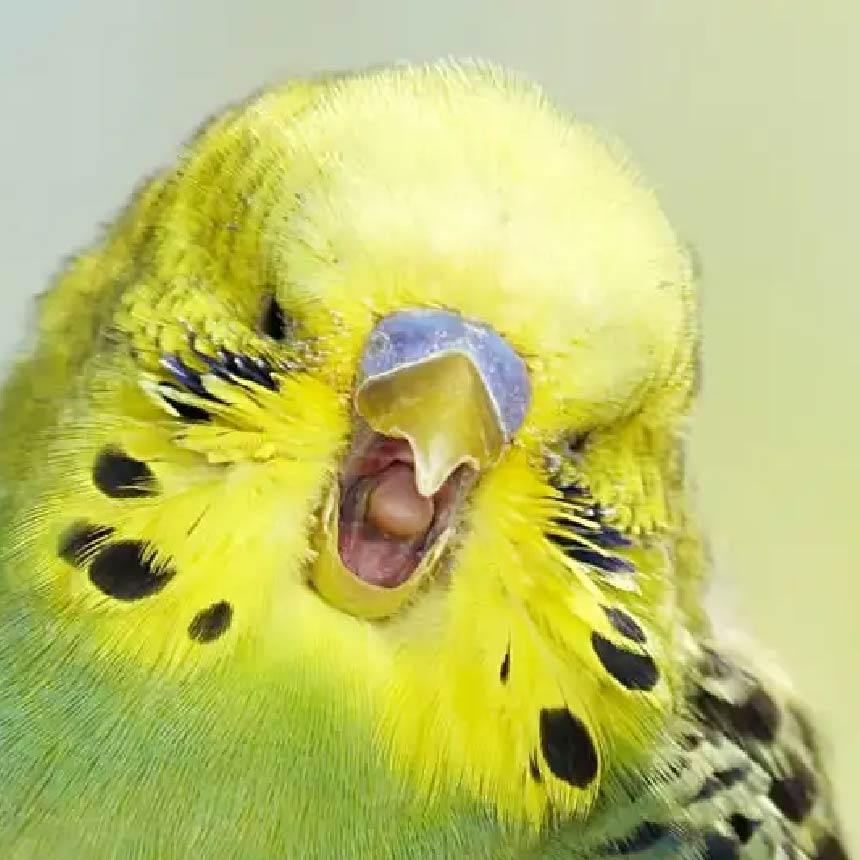
Budgie Common Illnesses
Budgie Common Illnesses As a healthy budgerigar (budgie) is normally active and vocal, a sick budgie can often be spotted by their change in behaviour. However, like all birds’ budgies will commonly hide weakness and their symptoms.
Careful observation will help identify a sick budgie, paying attention changes in behaviour.
Are they less vocal than normal?
We all get to know our pets. If you budgie is suddenly quitter than normal, it may be an indication that something is wrong and a tip to an avian vet may be called for.
.
Are they eating and drinking less than normal?
A sick budgie will often lose their appetite. If your budgie is suddenly eating and/or drinking less than usual, It is likely time to pay a visit to the avian vet.
.
Are they spending more time on the bottom of their cage?
A budgie (or all caged / aviary birds for that matter) are good at hiding the symptoms of illness. If the subtle warning signs outline above are not notice, your bird may become too weak to perch and spend more time on the floor.
If your budgie is spending more time on the floor (or sat in bowls) this is a clear indication that a trip to an avian vet is in order.
Budgies are social animals and live in flocks, a lonely budgie may exhibit similar symptoms of lethargy and loss of appetite (a lonely budgie would usually be more vocal). It is strongly advisable to speak to an avian vet before rushing down to the pet shop. A new budgie could make matters worse and even make the new budgie sick.
“ Budgie Common Illnesses ”
Budgie Common Illnesses – There are a number of illnesses common to budgies.
.
Tumours
All birds can develop tumors, which may be benign or malignant, like humans. They are also susceptible to lymphomas and lipomas. Budgies are particularly prone to lipomas, which are fatty tumors often seen in overweight or older birds. These tumors typically develop in the reproductive areas and kidneys, potentially putting pressure on the sciatic nerve and causing lameness in the foot or entire leg.
Fibromas, another type of tumour found on the wing, often require surgical removal. In severe cases, the entire wing might need to be amputated. Budgies can also develop testicular cancer, indicated by a purple-brown discoloration of the cere (the patch of skin around the nostrils above the beak). If detected early, treatment with the drug Lupron can shrink the tumor and facilitate recovery.
.
Giardia Parasite
The giardia parasite inhabits water used for drinking and bathing, eventually transferring to the bird’s intestinal tract. Budgies are particularly susceptible to this parasite, which passes through their system encased in a hard shell, allowing it to survive in the environment for some time. Giardia is one of the most common causes of waterborne diseases.
Symptoms of giardia infection in budgies include scratching as if infested with fleas, particularly on the flanks and legs. They may pull out their feathers and shriek as if in pain. Infected birds might also display pica, a behavior where they lick non-food items like toys and perches. Other symptoms include diarrhea, mucus production with a strong, foul odor, anorexia, weight loss, lethargy, and depression.
Giardia is treatable with anti-protozoal medication. To prevent reinfection, use a water dispenser instead of a bowl to ensure droppings don’t contaminate the water. Additionally, incorporating oregano into the bird’s diet can be beneficial due to its antioxidant properties and natural anti-microbial compounds, which have been shown to kill giardia.
.
Deficiencies
Another common issue among budgies is dietary deficiencies. This problem can affect any bird primarily consuming a seed-based diet, as seeds are high in fat and lack essential vitamins and minerals. Therefore, it is crucial to encourage your bird to eat green foods and fruits.
The most frequently observed deficiencies in budgies are in vitamin A, vitamin D, and calcium. One effective way to address this is by offering sprouted seeds, which are seeds germinated in warm water until the tiny plant begins to sprout. This germination process uses much of the seed’s fat reserves, leaving behind more nutritious elements.
Calcium deficiency can be particularly serious. Approximately 1.5% of a bird’s body is composed of calcium, which is essential for transmitting nerve impulses, forming eggshells in females, and contracting the uterus during egg-laying. Calcium is also vital for various cellular and internal functions. Normal blood calcium levels in a budgie range from 1.6 to 2.54 mmol/L. If you suspect your bird is not getting enough calcium from its diet or has recently been laying eggs, you can add a liquid calcium supplement to their water. This helps boost calcium levels and prevents the condition from worsening.
.
Gout
Gout is often thought of as a human disease, but it can also affect birds with budgies being somewhat more susceptible than other caged birds. It involves the deposition of uric acid crystals on organs and in the joints, caused by high levels of protein, calcium, and various other conditions and factors. Exposure to certain chemicals in drinking water, including pathogens that impact the kidneys, can also contribute to gout in pet birds.
Treatment begins with providing clean, filtered water. Your vet may prescribe medication or suggest dietary changes. Another natural remedy is Lily of the Desert Aloe, which can be formulated and added to soft foods. This has shown benefits in some birds and might be worth discussing with your avian vet.
.
Reproductive Problems.
As with all birds, budgies can experience various reproductive system issues. While we’ve mentioned calcium deficiency and its complications, it’s important to note that excessive egg laying can also lead to calcium deficiency and related problems. Ensure your female bird isn’t laying too many eggs. You cannot stop a bird from laying eggs, and simply removing the male bird or the nest box will only cause stress. However, when she lays eggs, whether fertile or not, allow her to sit on them for the normal term. This allows her body to recover from the egg-laying process.
Egg binding is another serious issue related to calcium deficiency, occurring when the bird cannot lay the egg. It can be fatal, so if your bird shows signs of an enlarged area around the vent (where the egg exits), lethargy, loss of appetite, or general unwellness, seek veterinary advice promptly to help save her life.
Post a Comment
You must be logged in to post a comment.








